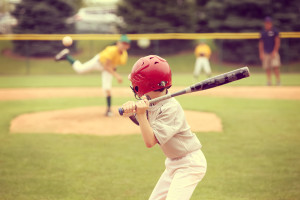Dangers in the Outfield
 With the end of school approaching, and now that we are in baseball season here in Marietta, Georgia, parents are asking me about mouthguards. Are they worth it? Are there really oral injuries in sports that we should be worried about? What if my kid hates them?
With the end of school approaching, and now that we are in baseball season here in Marietta, Georgia, parents are asking me about mouthguards. Are they worth it? Are there really oral injuries in sports that we should be worried about? What if my kid hates them?
Let me tell you – mouthguards are worth it. And your child might not like how it feels in their mouth, but it’s a lot more fun than having teeth knocked out and a trip to the pediatric dentist!
Baseball
Like many of the parents that I talk to, you might be thinking that your child’s teeth are safe from baseball injuries because they wear a helmet while they are up to bat.
And while it’s relatively rare that kids get hit by a pitch in their face or mouth, it happens. I’ve seen it happen, in fact. They should always wear a helmet and mouthguard!
Common Baseball Injuries
There are a couple common ways that kids lose, chip, or crack their teeth on the baseball diamond.
1. During Practice and Warm-Up. While the intensity and competitiveness of games account for a significant number of baseball injuries, more than half occur during training- in warm-up or practice. We’ve all seen this classic set-up: two rows of kids tossing the ball back and forth to get their arms warmed up.
That’s all fine and good until one of them starts talking to their buddy next to them. Their partner throws the ball, notices they aren’t paying attention, and then yells their name. The catcher turns just in time to take a baseball to the face. Ouch!
2. Out in the field. The other common tooth injury is when kids are in the outfield. They typically don’t wear their helmets out there so they are completely exposed. A ball that takes an unexpected bounce or a poorly judged flyball can lead to missing or chipped teeth.
Baseball has a high injury rate because the ball is small, solid, and moving fast. If someone makes a last minute error, their reflexes aren’t going to be quick enough to protect their mouth.
Basketball and Football
Dental injuries in basketball and football are more likely to come from other bodies. Body parts tend to have more give to them, as opposed to a baseball or worse – a hockey puck! Still, I definitely recommend a mouthguard in these situations because it’s better to be safe than sorry!
“Non-Contact” Sports
Even sports that are traditionally “non-contact” are dangerous. Soccer is becoming a contact sport because of competition (although the fast-moving balls is certainly not irrelevant). These kids are fighting so hard to win that they will do whatever they need to do! Even at a young age you can see the drive in them.
When To Start and How to Use
I’m sure you can see now why I recommend mouthguards for sports. Now, I know what you’re thinking – that they’ll complain, be uncomfortable, and the fight won’t be worth it. Trust me- based on years pediatric dental practice- it is.
The best way to avoid the fighting is to start them young. If a helmet with facial protection would be better for their particular sport, try that. I know that kids complain that they can’t see with helmets on, but remind them of football players. They’ve played with helmets on for their entire career – since they were kids! They are used to it and have learned to see – even with the blind spots.
What Kind of Mouthguard Should You Get?
Especially at a young age, it really doesn’t matter. Get the cheapest one – it will still be much better than nothing. Many mouthguards can be softened by boiling, and then given to the young athlete who bites down to form a custom shape- a much more comfortable option.
Once they are preteens and teenagers, you can get custom-made mouthguards. While their mouth is growing and changing, you may need to replace these every year or so. These custom mouthguards will be more comfortable, they will stay in place better, and will provide better protection because of those things.
Once their permanent teeth are in and any orthodontic work is done, the custom-made guards will last for years. To keep them fresh and clean over those years, make sure to have them brush and rinse them after every use.
Now, what are you waiting for? Keep your child’s teeth safe this baseball season with a mouthguard!
~Dr. Rhea Haugseth





